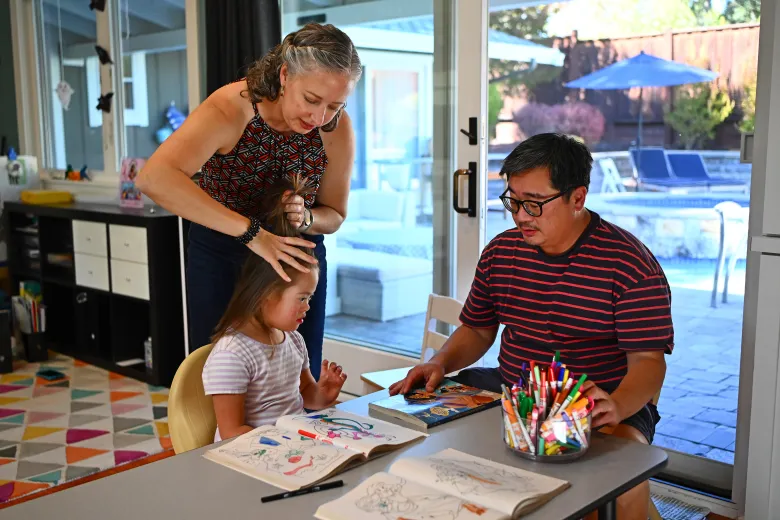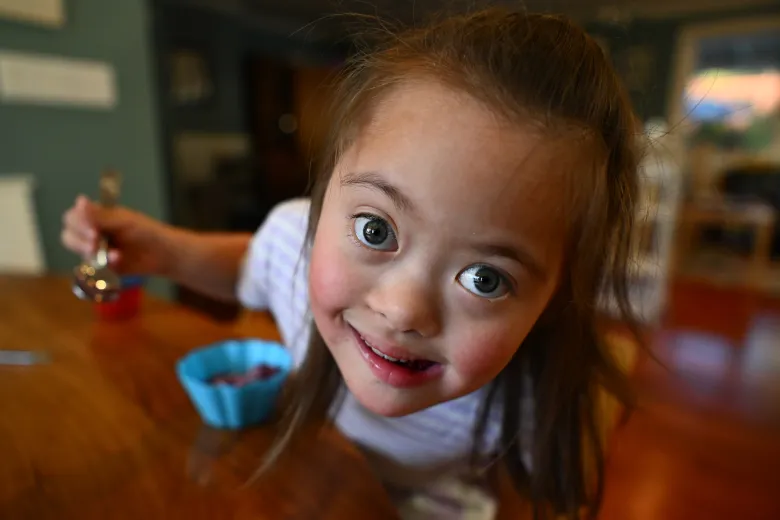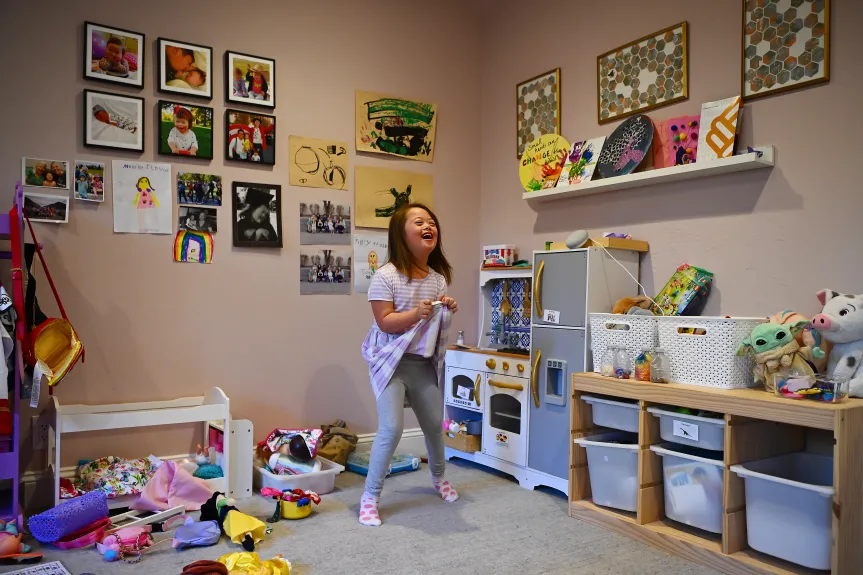By the time June Lin arrived into the world, five weeks early and weighing 5 pounds, 6 ounces, she already had scores of supporters to help guide her for the rest of her life.
June has Down syndrome, something that at one time would have meant her birth was a tragedy. Now, her life and those of other children are celebrated through the work of the Down Syndrome Connection of the Bay Area.
Suzanne and Mike Lin, of Danville, excited to learn they were expecting their first child, decided to do a blood test about halfway through the pregnancy to learn the sex. The test also would look for genetic anomalies.
“I just wanted to know if I was having a boy or a girl,” Suzanne says. “They had the science to do it and so I thought, ‘Why not use the science?’”
The Lins not only found out that their firstborn would be a girl; they also found out that she had a duplication of Chromosome 21, which meant that June had Down syndrome, a simple glitch in genetics that will shape not only June’s future but that of her family.
The Lins struggled to make sense of everything. Why them? Why June? What would it be like to care for an infant, child and later an adult with Down syndrome? Would they be up to it? How would they tell their friends and family?
That’s when the Down Syndrome Connection of the Bay Area reached out to them, offering answers to their questions and a community of parents who have all been where the Lins found themselves.

“We empower, inspire, and support people with Down syndrome, their families, and the community that serves them, while fostering awareness and acceptance in all areas of life,” says Teresa DeVincenzi, executive director of the non-profit organization founded in 1998.
Down Syndrome Connection, based in Danville but serving the entire Bay Area, works with about 250 children and young adults with Down syndrome, and serves more than 2,600 people through a variety of programs.
That includes the Communication Readiness Program, New and Young Families Support, Information and Referral, the Together, Happy, Respected, Independent, Valued, Empowered (THRIVE) program, the Down Syndrome Educational Alliance, and the Down Syndrome and Autism Alliance.
The organization also offers support groups including the very popular Music Therapy, Medical Outreach and Mental Health Alliance.
“The Down Syndrome Connection is a critical resource for families with a child born with Down syndrome,” DeVincenzi says, “and we are there for them as their child grows, with programs at every stage in the life cycle.”

For the Linn family, that support and assistance began before June’s birth.
Suzanne was in her mid 30s, which put her at risk for a high risk pregnancy – many children with Down syndrome are born to older mothers – but that wasn’t even a concern for her when she chose a more advanced test to determine the sex. The couple was looking forward to sharing the news with friends and family, but instead, Suzanne got a phone call saying the couple was being referred to a genetic specialist. Additional testing confirmed the earlier diagnosis.
The doctors at Kaiser gave the Lins a pamphlet for the Down Syndrome Connection of the Bay Area, but it was a while before Suzanne could even bring herself to look at it.
“Everything felt like a dead end,” Suzanne says. “There were no right answers.”
At 22 weeks pregnant, the Lins still had the option of ending the pregnancy, but they weren’t sure they wanted to do that. The floor had dropped out from under them, Suzanne says, but they found surer footing after reaching out, through the Connection, to a mother of an older child. The woman was honest with them, but also hopeful. She showed not an ounce of regret.
Meanwhile, Mike, who admittedly is the more analytical, started making a chart. It showed their fears and concerns, but for every negative, Mike had found many positives, including his belief that being June’s mom and dad would make them better parents than they might have been otherwise.
June, now 7, loves Disney princesses, coloring, books and asking “Hey Google, fart.” Her younger brother, Oliver, 6, taught her that. When it came time to enter school, the Lins participated in the organization’s Communication Readiness Program, which prepares the student and family for what’s ahead and provides the children with a way to better communicate with their teachers and fellow students.
The organization gave June an iPad loaded with a speech program. She pushes the buttons and the iPad speaks for her. It has helped her, the Lins say, to step out of the isolation her disabilities can put her in, and to help her speak for herself.
“She has so many ideas and thoughts,” Suzanne says, “and sometimes it’s about being silly and sharing a joke, and I think a lot of times she has to keep that inside because it’s a lot of work to get it out.”
Using her voice, the iPad “talker,” and sign language, June feels she is being heard, Suzanne says.
Money raised through Share the Spirit will go toward supporting the organization’s programs, DeVincenzi says.
“Our goal in everything that we do,” DeVincenzi says, “is to try to see each other as humans and to celebrate our abilities because there are so many.”
